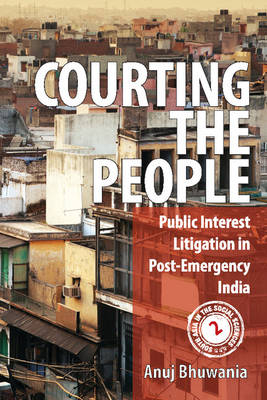
Courting the People
Public Interest Litigation in Post-Emergency India
Seiten
2017
Cambridge University Press (Verlag)
978-1-107-14745-4 (ISBN)
Cambridge University Press (Verlag)
978-1-107-14745-4 (ISBN)
This book shows how public interest litigation (PIL) grants appellate courts flexibility in procedure, allowing them to manoeuvre themselves into positions of overweening authority. It locates the political challenges that PIL uses in its very process, arguing that its fundamentally protean nature stems from its mimicry of ideas of popular justice.
Based on empirical research, this book shows how public interest litigation (PIL) grants the appellate courts enormous flexibility in procedure, allowing them to manoeuvre themselves into positions of overweening authority. While PIL cases are usually politically analysed solely in terms of their effects, whether beneficial or disastrous, this book locates the political challenges that PIL poses in its very process, arguing that its fundamentally protean nature stems from its mimicry of ideas of popular justice. It examines PIL as part of a larger trend towards legal informalism in post-Emergency India. Casting a critical eye over these institutional reforms that aimed to adapt the colonial legal inheritance to 'Indian realities', this book looks at the challenges posed by self-consciously culturalist juridical innovations like PIL to ideas of fairness in adjudication, as well as democratic politics.
Based on empirical research, this book shows how public interest litigation (PIL) grants the appellate courts enormous flexibility in procedure, allowing them to manoeuvre themselves into positions of overweening authority. While PIL cases are usually politically analysed solely in terms of their effects, whether beneficial or disastrous, this book locates the political challenges that PIL poses in its very process, arguing that its fundamentally protean nature stems from its mimicry of ideas of popular justice. It examines PIL as part of a larger trend towards legal informalism in post-Emergency India. Casting a critical eye over these institutional reforms that aimed to adapt the colonial legal inheritance to 'Indian realities', this book looks at the challenges posed by self-consciously culturalist juridical innovations like PIL to ideas of fairness in adjudication, as well as democratic politics.
Anuj Bhuwania teaches at the Department of Sociology at South Asian University, New Delhi. His research interests are legal anthropology, anthropology of media, public law, post-colonial Indian politics, anthropology of human rights and criminal justice and policing.
Acknowledgements; Introduction; 1. Competing populisms: revisiting the origins of public interest litigation in India; 2. The case that felled a city: a public interest litigation with nine lives; 3. Public interest litigation as a slum demolition machine; 4. Good judges, bad judges: critical discourses on public interest litigation in India; Conclusion: the procedural is political; Index.
| Erscheinungsdatum | 02.04.2016 |
|---|---|
| Reihe/Serie | South Asia in the Social Sciences |
| Verlagsort | Cambridge |
| Sprache | englisch |
| Maße | 155 x 232 mm |
| Gewicht | 380 g |
| Themenwelt | Recht / Steuern ► Allgemeines / Lexika |
| Recht / Steuern ► EU / Internationales Recht | |
| Recht / Steuern ► Öffentliches Recht ► Verfassungsrecht | |
| ISBN-10 | 1-107-14745-X / 110714745X |
| ISBN-13 | 978-1-107-14745-4 / 9781107147454 |
| Zustand | Neuware |
| Haben Sie eine Frage zum Produkt? |
Mehr entdecken
aus dem Bereich
aus dem Bereich
Buch | Hardcover (2024)
C.H.Beck (Verlag)
75,00 €


